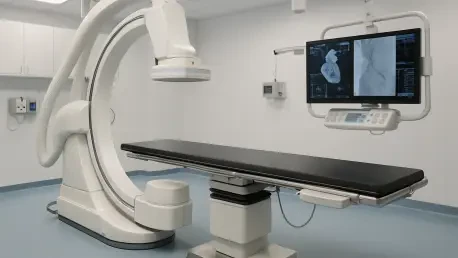In a landscape where healthcare systems worldwide grapple with rising demands and constrained resources, a transformative partnership between Manchester University NHS Foundation Trust (MFT) and Medtronic, a global leader in medical technology, offers a beacon of hope for the National Health Service (NHS) in the UK. This collaboration, rooted in a shared commitment to innovation, seeks to address critical clinical challenges through advanced solutions that could redefine patient care. By focusing on cutting-edge fields such as artificial intelligence (AI) and robotic surgery, the alliance aims to not only enhance outcomes within Greater Manchester but also set a precedent for global healthcare advancements. This strategic union, formalized through a Research, Development, and Innovation (RDI) agreement, harnesses MFT’s clinical expertise alongside Medtronic’s technological prowess, promising to tackle unmet needs in areas like cardiovascular health and diabetes management. The potential impact of this initiative sparks curiosity about how such collaborations can reshape the future of public health systems.
Pioneering Innovation in Healthcare Delivery
Leveraging Technology for Clinical Breakthroughs
The partnership between MFT and Medtronic places a strong emphasis on integrating advanced technologies to address pressing healthcare gaps. A primary focus lies in the development of AI-driven tools and robotic surgery systems, which have the potential to revolutionize how complex procedures are performed within the NHS. By targeting specialties such as neuroscience and medical surgery, the collaboration aims to enhance precision and reduce recovery times for patients. This initiative is not merely about adopting new tools but about creating customized solutions that align with specific clinical needs identified by MFT’s healthcare professionals. The use of anonymized data through MFT’s Clinical Data Science Unit further supports this by transforming insights into actionable innovations. Such a data-driven approach ensures that the technologies developed are both relevant and adaptable, positioning the NHS to meet future challenges with greater resilience and efficiency.
Aligning with National Health Strategies
Beyond technological advancements, this collaboration aligns closely with the NHS’s long-term vision for transformation, particularly in shifting care from hospital-centric models to community-based solutions. Medtronic’s extensive portfolio of remote patient monitoring tools complements this goal by enabling healthcare providers to manage chronic conditions like diabetes outside traditional settings. This strategic alignment reflects a broader commitment to digital transformation within the NHS, moving away from analog systems to more integrated, tech-enabled frameworks. The partnership also resonates with the UK government’s ambition to establish the country as a life sciences powerhouse, with Manchester emerging as a central hub for innovation and investment. By fostering such synergies, the initiative not only strengthens local healthcare delivery but also contributes to national economic goals, highlighting the multifaceted impact of public-private collaborations in the health sector.
Global Impact and Future Potential
Scaling Solutions Beyond Local Boundaries
One of the most compelling aspects of the MFT-Medtronic alliance is its potential to create healthcare solutions with a global reach. While the immediate focus remains on improving patient outcomes in Greater Manchester, the innovations developed through this partnership are designed to address universal clinical challenges. For instance, advancements in cardiovascular care and remote monitoring systems could benefit healthcare systems in other regions facing similar issues with heart failure management. The proven success of initiatives like the ‘TriageHP Plus’ remote heart monitoring pathway, which has already reduced hospitalizations, serves as a testament to the scalability of these solutions. Recognized by the National Institute for Health and Care Excellence (NICE), this pathway illustrates how targeted innovations can be adopted on a wider scale, offering a blueprint for other NHS trusts and international health organizations to follow.
Building on a Legacy of Collaborative Success
Reflecting on the historical foundation of this partnership reveals a decade-long journey of impactful collaboration between MFT and Medtronic. Past achievements, such as the development of remote monitoring tools for cardiac patients, have already demonstrated tangible benefits in reducing hospital admissions and improving quality of life. This track record of success provides a robust platform for current and future projects, instilling confidence in the partnership’s ability to deliver meaningful results. The emphasis on continuous innovation, supported by MFT’s infrastructure like the National Institute for Health and Care Research (NIHR) HealthTech Research Centre, ensures that the collaboration remains at the forefront of medical advancements. As Manchester solidifies its position as a leader in the £120 billion life sciences industry, the ripple effects of these efforts are poised to influence global healthcare trends, showcasing the power of sustained, strategic alliances in driving systemic change.
Reflecting on a Vision for Tomorrow
Looking back, the alliance between Manchester University NHS Foundation Trust and Medtronic stood as a landmark effort that redefined healthcare innovation within the NHS. The integration of AI, robotics, and remote care technologies marked a significant leap forward in addressing critical clinical needs. As the partnership progressed, the focus on scalability ensured that solutions pioneered in Greater Manchester reached far beyond local boundaries, offering hope to patients and providers worldwide. Moving forward, the emphasis should remain on fostering similar public-private collaborations to sustain momentum in healthcare transformation. Exploring additional areas of unmet need, investing in emerging technologies, and strengthening data-driven research will be crucial steps to build on this legacy. This collaborative model serves as an inspiring framework for other regions and systems, proving that united efforts between clinical and technological leaders can pave the way for a healthier, more resilient future.









